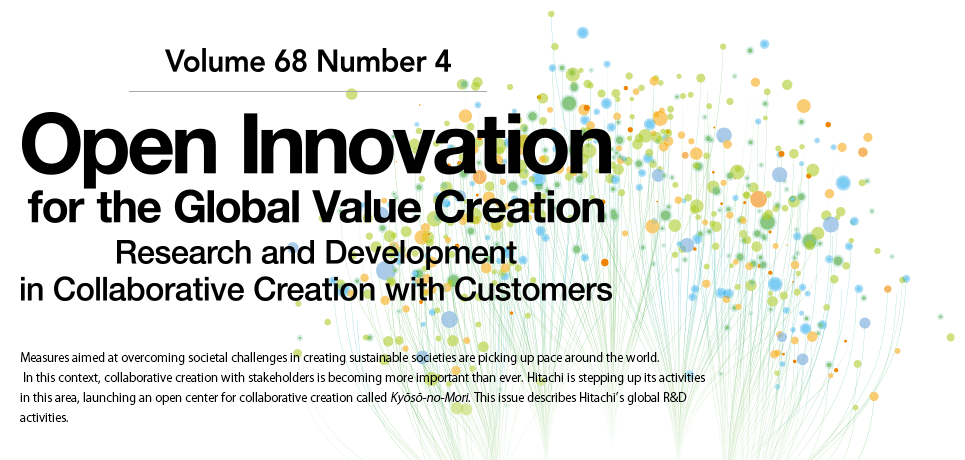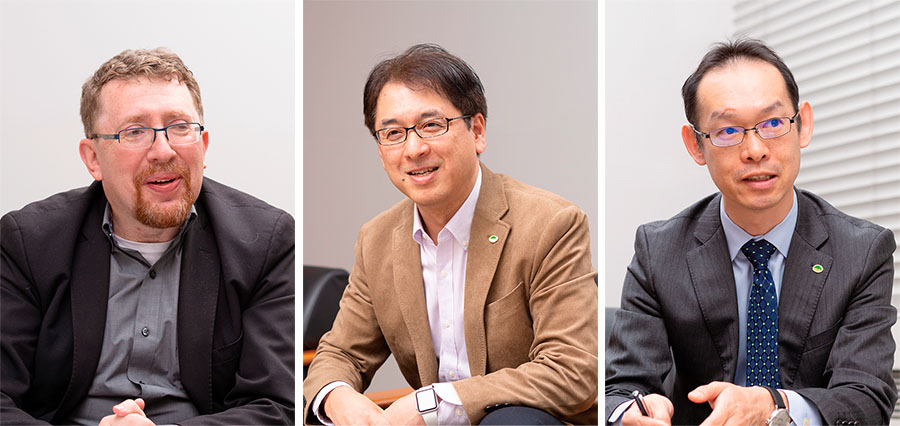
Measures aimed at overcoming societal challenges in creating sustainable societies are picking up pace around the world. In this context, collaborative creation with stakeholders is becoming more important than ever. Hitachi is stepping up its activities in this area, launching an open center for collaborative creation called Kyōsō-no-Mori. This issue describes Hitachi’s global R&D activities.


In this article, Norihiro Suzuki, the General Manager of Hitachi's Research & Development Group, talks about his hopes for the newly established “Kyōsō-no-Mori,” a place for open collaborative creation, and his vision for research and development that pioneers sustainable future society supporting the role that Hitachi intends to undertake.

Hitachi has taken the next step to accelerate innovation in collaborative creation with different stakeholders by launching Kyōsō-no-Mori. For this article, Hitachi Review spoke with two key people about a range of subjects, including the background and objectives of Kyōsō-no-Mori, the features of the building, and the outlook for the future.

Realizing the future society envisaged by the United Nations’ SDGs and Japan’s Society 5.0 will require a transformation of industrial and societal systems driven by digitalization, with AI playing a core role. Hitachi Review invited Mark Minevich, a world-renowned industry expert on AI, to look ahead to future society and potential uses of AI.


Since signing a partnership with the Centre for the Fourth Industrial Revolution in April 2018, Hitachi has drawn on its technologies and its experience using them to assist the Centre in its activities in this partnership role. This article describes the activities of the Centre itself as well as what Hitachi is doing there.

As a frontline research and development facility for devising new services and business models, Hitachi’s Global Center for Social Innovation (CSI) has worked with customers worldwide to put collaborative creation into practice in the key sectors for their respective regions. Through its involvement with these initiatives, CSI is working with customers to overcome the challenges faced by industry and other parts of society, to achieve innovation, and to help its customers grow.
New trends such as data capitalism are creating major worldwide structural changes in industry along with the rise of digitalization. Under these circumstances, Hitachi, with the aim of becoming a global leader, is working on creating world-class technologies originating from the new value being found in today’s growth areas.
With its mission of “Creating human-centric value and promoting such concepts through research into the challenges we face,” Hitachi ‘s Center for Exploratory Research is seeking to sketch out a desirable society of the future in a time of uncertainty, and to utilize open innovation to bring it about.


While making the vast amounts of data contained in the National Database of Health Insurance Claims and Specific Health Checkups of Japan(1) available in a convenient and appropriate form might be considered a duty to society, enabling the simple, high-speed, and accurate analysis of this dataset (which is among the world’s largest) is no easy task. Through open innovation with the Institute for Health Economics and Policy of the Association for Health Economics Research and Social Insurance and Welfare and the Institute of Industrial Science at the University of Tokyo, Hitachi has developed the super-fast super-interdisciplinary Japanese medical insurance claim big data analytics platform system, a next-generation platform for studying this data that helps extract new evidence from the information it contains. This article describes three different activities by Hitachi aimed at ensuring that the system will continue to find use in the future together with details of how the data is being used by a research project of the Institute for Health Economics and Policy.